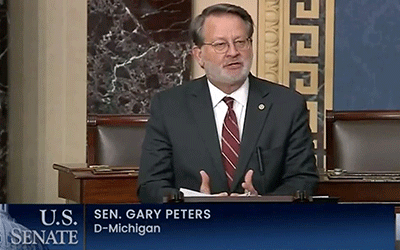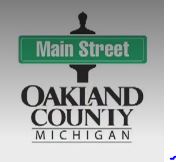
Gary Peters: Americans still need additional support
|
|
|||
|

|
|
|||
|


Press Release FOR IMMEDIATE RELEASE: March 16, 2021 CONTACT: Bob Wheaton, 517-241-2112, wheatonb@ Additional food assistance for 350,000 Michigan families in response to COVID-19 extended through March LANSING, Mich. – Approximately 350,000 Michigan families will continue to have access to additional food assistance benefits during March as a response to the COVID-19 pandemic, the Michigan Department of Health and Human Services (MDHHS) announced today. Michigan previously approved the additional food assistance beginning in March 2020 – and now that is being extended for March 2021 with approval from the U.S. Department of Agriculture Food and Nutrition Service. “Michigan has been a national leader in making sure families can put food on the table during COVID, and we must continue to ensure that no Michigander goes hungry during this challenging time,” said Governor Gretchen Whitmer. “I am pleased to work with our federal partners to continue supporting 350,000 families through March.” Eligible clients will see additional food assistance benefits on their Bridge Card March 20 to 30. Additional benefits will be loaded onto Bridge Cards as a separate payment from the assistance that is provided earlier in the month. “MDHHS remains dedicated to helping families afford groceries. We are all in this together as we combat COVID-19,” said MDHHS Director Elizabeth Hertel. “I promise we will continue to work tirelessly on behalf of Michiganders who are in need.” Nearly 1.3 million people in Michigan receive federal Supplemental Nutrition Assistance Program (SNAP) benefits through the state’s Food Assistance Program. Households eligible for Food Assistance Program benefits will receive additional benefits in March to bring all current SNAP cases to the maximum monthly allowance for that group size. This change only applies to customers not currently receiving the maximum benefit amount. The 350,000 households that receive increased benefits represent close to 50 percent of the more than 707,000 Michigan households that received food assistance in January. The remaining households already receive the maximum benefit. Below are the maximum allowable benefits for SNAP customers based on their respective household size:
The federal government is providing additional funding to states for food assistance under House Resolution 6201, the Families First Coronavirus Response Act. Eligible families do not need to re-apply to receive the additional benefits. People who receive food assistance can check their benefits balance on their Michigan Bridge Card by going online to www.michigan.gov/MIBridges or calling a consumer service representative toll-free at 888-678-8914. They can ask questions about the additional benefits by calling or emailing their caseworker. Customer service is available 24 hours a day, seven days a week. Spanish and Arabic service is available. If you are deaf, deafblind, or hard of hearing or speech-impaired, call the Michigan Relay Center at 7-1-1. Information around the COVID-19 outbreak is changing rapidly. The latest information is available at Michigan.gov/Coronavirus |

Press Release FOR IMMEDIATE RELEASE: March 11, 2021 MDHHS CONTACT: Bob Wheaton, 517-241-2112, wheatonb@ LEO CONTACT: Elyse Walter, 517-449-9731, waltere@ Michigan low-income college students enrolled in career and technical education programs can apply for food assistance Benefits available to Perkins program enrollees LANSING, Mich. – Michigan students in college career and technical education programs are reminded they are now eligible to receive food assistance if they meet other eligibility requirements. The Michigan Departments of Labor and Economic Opportunity (LEO) and Health and Human Services (MDHHS) are encouraging students to apply for food assistance benefits online at Michigan.gov/MIBridges. LEO and MDHHS developed this new initiative in 2020 to address rising food insecurity among students that has been made worse by COVID-19. Close to 16,000 low-income college students in Michigan who are enrolled in career and technical education (CTE) programs are eligible to receive food assistance benefits through the federal Supplemental Nutrition Assistance Program (SNAP). “As many CTE students are back on their campuses, what better time to encourage them to take advantage of critical resources that will support their lives as they prepare for high-demand, critical job openings,” said LEO Acting Director Susan Corbin. “These SNAP benefits will help them focus on their educational needs and prepare for a successful future.” Previously, college students enrolled in qualifying CTE programs who attended school at least half-time could not qualify for SNAP benefits, even if they met income eligibility requirements, unless they fell into certain categories such as working at least 20 hours per week, caring for a child, or being unable to work. “MDHHS was already working to help more people put nutritious food on the table prior to the pandemic,” said MDHHS Director Elizabeth Hertel. “COVID-19 made this priority even more critical. Due to the pandemic, many students lost their jobs. As a result, they lost their SNAP eligibility through no fault of their own.” College students in Michigan are eligible for SNAP if they meet income and other program requirements and are enrolled at least half-time in an occupational program that leads to employment under the Strengthening Career and Technical Education for the Twenty-First Century Act of 2018 known as Perkins V. Additionally, CTE college students who enroll in SNAP can take advantage of an additional payment provided each month until June, which amounts to an extra 15% to help recipients affected by the COVID-19 pandemic. The Perkins Postsecondary Career and Technical Education Program provides funding to 28 community colleges, three public universities and one tribal college to support pathways to high-wage, high-skilled, and in-demand careers that require less than a bachelor’s degree. Those institutions offer more than 3,600 qualifying programs, offering a certificate or associate’s degree to careers in fields such as information technology, health care, hospitality and manufacturing. There are nearly 90,000 students enrolled in these programs in Michigan. Some of those students may already be receiving food assistance benefits, while others will become eligible for this new opportunity. For anyone currently enrolled in a Perkins program with an existing food assistance case who has experienced a loss of income, their MDHHS caseworker will determine Perkins program status to ensure the benefits are correct. Students interested in applying for food assistance can go to Michigan.gov/MIBridges. Verification of enrollment in a Perkins program must be provided by the student or may be requested from the postsecondary institution. |

Pontiac, Michigan – The Main Street Oakland County crowdfunding campaign to support downtown small businesses struggling because of the coronavirus pandemic has raised more than $300,000 thanks to a recent $10,000 boost from ITC Michigan, based in Novi, Michigan.
The countywide campaign, launched in the early days of the pandemic last year, is the first of its kind in the nation to be sponsored by a Main Street program. The funds were generated from 21 of Main Street Oakland County’s 25 designated communities. The campaign surpassed its original $100,000 goal due to generous contributions from the general public, local governments and corporations, like ITC.
Funds raised were utilized by local downtown management organizations to provide grants for more than 200 small businesses independently owned and operated with 30 employees or less, including retailers and restaurants in the various downtown districts.
“Small businesses are the life blood of our economy and the hope for our future when we emerge from the COVID-19 pandemic,” Oakland County Executive David Coulter said. “That’s why it’s been vital to support them throughout this public health crisis in a number of ways, including with the Main Street Oakland County crowdfunding campaign. Thank you to ITC Michigan for their generosity.”
Main Street Oakland County matched dollars raised by each community at $1 for each $1 contributed, up to $4,000. The campaign used the Patronicity platform, and each community set their own fundraising goals and made their case to the public to build their fund.
“ITC Michigan has always taken an active role in the communities we serve,” said Simon Whitelocke, president of ITC Michigan. “During this extraordinary time, there are tremendous humanitarian and economic needs across our home state. We’re proud to support the Main Street Oakland County crowdfunding campaign, which is making a positive impact on the small business community that is so vital to our economy.”
The crowdfunding campaign was one of the many ways Oakland County assisted businesses throughout the pandemic. The Oakland County Executive and the Board of Commissioners allocated over $80 million of the county’s share of CARES Act funding to small businesses. These included:
Plus, the county coordinated the Michigan Small Business Survival Grant which awarded over $6 Million to 1,348 businesses.
The following crowdfunding participating communities, ranging from 600 to 60,000 in population, met or exceeded their funding marks over the course of the two-month campaign: Berkley, Birmingham, Clarkston, Clawson, Farmington, Ferndale, Franklin, Hazel Park, Highland, Holly, Lake Orion, Lathrup Village, Leonard, Madison Heights, Oak Park, Ortonville, Oxford, Pontiac, Rochester, South Lyon and Wixom.
The crowdfund contributions were used by each community to help their small businesses pay for rent, utilities, wages, inventory, PPE acquisition, and marketing. For example, the Ferndale Downtown Development Authority utilized funding to develop a marketplace for their small businesses where they could obtain difficult to find PPE at no cost. The Wixom Downtown Development Authority provided grants to small businesses that allowed them to keep operating and prevent their permanent closure.
All donations were coordinated through the Community Foundation of Greater Rochester. Questions about the program can be sent to Main Street Oakland County coordinator John Bry at [email protected].
In 2020, public and private investment in Main Street Oakland County totaled almost $36 million and resulted in 24 net new jobs; 36 net new businesses; and contributions of more than 16,308 volunteer hours.
To date, more than $962 million in public and private investments have been made to Main Street Oakland County downtowns, establishing 1,254 net new businesses and generating more than 8,000 jobs. Oakland County is the first and still only county in the United States to operate a full-service, county-wide Main Street program.

|